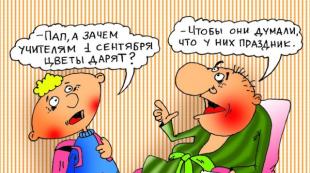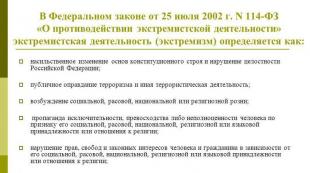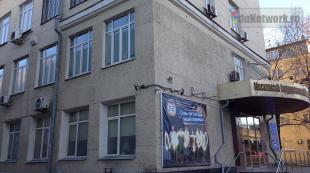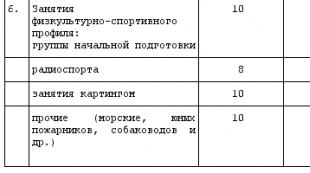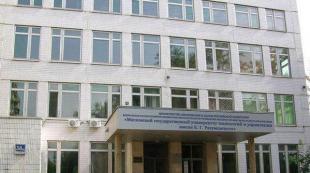Specialty Valeology. What is valeology? Valeology is divided into general and industry
A modern qualified teacher should have valeological education, the foundation of which is the principles of humanity, forecasting, integrity, scientific validity and constancy.
The basis of the valeological culture of teachers is the science of valeology.
Valeology (from Latin "Valeo" - "Be Healthy") - Young integrative science, comprehending agents and patterns aimed at forming, restoring and strengthening the health of each person using a variety of health techniques and technologies.
The formation of health implies a set of actions aimed at optimizing fertility, growth and education of adolescents.
Restoration of health provides for following the rules of a healthy lifestyle (in the valeological aspect), as well as measures aimed at returning lost health (recovery) and maintain it at the same level.
Health promotion includes its increase with healthcare procedures and training.
The World Health Organization Health is defined as the achievement of the state of absolute moral, physical and social well-being, and not only the elimination of diseases and the lack of physical disadvantages, this is especially important, especially when valeology is used in kindergartens and schools, at the stage of the formation of children as whole personalities.
In the concept of valeology, health is the ability of the human body to maintain its performance in changing conditions. ambient. This is a kind of standard you need to achieve.
Thus, valeology includes theoretical and practical management tools of all aspects of human health - physical, psychological and spiritual state, its place in society.
Valeology is divided into general and industry.
Task general Valeology is the formation of generalized scientifically based laws of lifestyle of a healthy person.
Sectoral Valeology. Learn health in context with other sciences. There is psychological, medical, family, pedagogical, sports valeology, etc.
Like any branch of science, Valeology has its own subject, an object for study, methods, methodological bases, goals and objectives.
The subject of science of valeology is individual human health, health reserves, the functions of its organism and the possibility of their regulation and correction.
Object of valeology He is healthy in all aspects of a person and a person at the presets.
Pre-Polezne - the risk of worsening health due to pathological processes occurring regardless of the action of external factors, as a result of a reduction in health reserves.
Among the methods applied by valeology - statistical, logical techniques and methods, combinatorics.
Thanks to valeological techniques and technologies, it is possible to detect people in need of health promotion in a timely manner. By applying the methods of recovery, there is a removal of their presets. Thus, valeological technologies serve as the foundation of the primary prevention of morbidity.
In addition, valeological technologies are applicable to the already sick person. In this case, the aspect of the secondary valeological prevention of the disease is manifested. The direct use of recovery techniques leads to an increase in health reserves, resume the functions of self-regulation and self-reproduction, prevention of the effects of the disease and its distribution in the body.
- Health is understood as an independent socio-medical category, which can be described qualitatively and quantitatively. The task of valeology is to form, maintain and strengthen health.
- The transition from the stage of health in the preceding stage is preceded by a certain state. At the same time, health is a more extensive category, while the disease and presets are rather narrow concepts.
Disease and presets are a health status in which its reserves are reduced or some violations or damage appear.
- The approach to human health in valeology is integrative, systemic, the methods used in it are not medical, but for the most part natural.
Thus, the main goal of valeology as science is becoming the improvement of the human body by attracting people to a healthy lifestyle.
Tasks are facing: to strengthen health, favorable an improvement in the standard of living of an individual, promote its adaptation in society, to investigate the patterns of formation and maintaining individual health.
Many compare valeology with hygiene. Undoubtedly, they have them, but still these are two different sciences. The subject of valeology is the health of the individual, the functions of its body and the ability to influence them. And the subject of hygiene is the study of the relationship between external factors (natural and social) and human health. The object of valeology is a healthy person and a person in the "third state" (pre-absenteeism). Object hygiene - external factors and man. Thus, hygiene comes from the external environment to a person, and valeology, on the contrary, from a person - to the medium.
Although it is worth noting that the recent studies of hygienists are built on an inversion-free inversion approach - they have passed on the assessment of health to the assessment of its factors.
There is a mistaken opinion that valeology is a science of knowledge of a healthy lifestyle.. But the lifestyle is a wide social group that includes not only the absence of bad habits and sports, and the financial consistency, profession, the level of education, the degree of human culture and much more. Studying the impact of the lifestyle on health is the subject of social hygiene. And valeology only produces the principles of lifestyle, due to the consecration, the formation, restoration and health promotion occurs.
Young science Valeology is still in the formation stage. The foundation for its development was: ecology, biology, anatomy, psychology, sociology, physical education, pedagogy, hygiene, human life safety.
The need for valeological knowledge is due to the fact that in their absence, a person may incorrectly understand his health and throw from one extreme to another - to strengthen it with frightening fanaticism or to abandon the formation and health promotion due to fear to harm himself.
The lack of knowledge in the field of valeology generates many speculations and myths regarding some diseases, for example:
- Church Myth - All Diseases are given to me for my sins.
- Psychogenetic myth - all mine mental diseases I got inheritance.
- Bioenergetic myth - I am sick because of the "energy vampires" pull my vitality.
- The psychoanalytic myth is all diseases due to the fact that my relationships with the parents have fallen unsuccessfully.
- Karmic myth: Diseases are now a kara for sins in a past life or sins of my ancestors.
- Sociocentric myth - I fell ill because I fulfilled my destination on Earth and stopped being necessary.
- Astrological myth - I fell ill, because the stars are "settled."
There are many of these myths. And thanks to the valeology, the younger generation can correctly form its idea of \u200b\u200bhealth, appreciate it and refers to similar speculations skeptically. Formation of health is a category in which there is no place for assumptions and guessings, this is a serious problem of modern society, which requires a serious and holistic approach to the decision, both by the person and professionals in their field - doctors, scientists, educators, social workers.
The great teachers of the past are not in vain, they argued that physical, spiritual, and moral health is the same thing. " LA vale!", - spoke in Ancient Rome, Welcoming the interlocutor and wanting to he health. Therefore, valeology can be bolder integral discipline that harmoniously encompasses the Harmony-Love-Beauty Triad.
Health sources
The origins of valeology, like science, lies still in ancient times. Arising at the junction of biology, hygiene and ecology, this science has a goal to strengthen both the physical and spiritual human health.. Our great ancestors starting from Suvorov, and ending with Tolstoy, at the time proved that following the principles of a healthy lifestyle allows not only to maintain high performance, but also to feel great at least thirty, even fifty, at least seventy years.
Already at the end of the 20th century, the term "Valeology" was introduced to the domestic specialist I. Brechman, who noticed that the increase in mortality with a general decrease in immunity leads to a total deterioration in public health. And in order to prevent the crisis in this area, it should be struggling with a lack of literacy in the field of health. This was the reason for creating a general health theory, in addition to hygiene and biology, the principles of alternative medicine and philosophical-religious teachings are included.
Despite the fact that this science does not have a single theoretical base, today there are many institutions of valeology, conferences on the general theory of health are held annually. Recently, scientists set forth the purpose of implementing school Program The corresponding learning subject. However, Valeology comes in our country gradually - the cause of this science deficit.
Health - all head
It is known that each a man on Earth has a powerful intellectual and physical potential. Another thing is that, due to the catastrophic environmental situation on Earth, most of its abilities turns out to be blocked. Valeology as science is aimed at rehabilitate the mind and human health due to physical training, rational nutrition and hardening. General health theory argues that better man It is physically prepared, all the more efficiently it is able to withstand external viral attacks, the more he is resistant to immunodeficiency.
Therefore, valeology is set to strengthen health through the training of the subject of hygiene, the correct regime of labor and recreation, physical education and running skills, healthy nutrition rules.
The term "Valeology" was introduced in the early 80s of the 20th century Brechman I.I. But at present, not everyone knows what kind of valeology is. Let's try to figure it out in this matter.
Valeology is a science of a healthy lifestyle, studying the level, reserves and potential of human mental and physical health, as well as methods and methods of its strengthening and conservation. A healthy lifestyle involves a refusal of bad habits, proper nutrition, sports, rationally organized recreation and labor regime.
Valeology is closely related to other sciences. It is located on the border with physiology, psychology, pedagogy, hygiene, anatomy, sociology.
What is studied valeology
The subject of the research of valeology is individual human health, its mechanisms and management of them.
The object of valeology is individuals that are in the Health Range. In other words, it can be said that a practically healthy person and a person who is in a preseigned state is considered to be the object of valeology.
Valeology analyzes individual health as a separate medical and social group, the essence of which can be characterized using high-quality and quantitative indicators.
The purpose of valeology is to implement inherited mechanisms and reserves of human life, support its adaptation to the conditions of the external and internal environment on high level.
The main tasks of valeology
- Quantitative assessment and study of the health status of a person and its reserves.
- Creating installations aimed at a healthy lifestyle.
- Strengthening and maintaining human health by attaching to a healthy lifestyle.
Valeology also solves the tasks of learning and the task of a wellness, educational and educational nature.
Valeology is developing methods and methods of health promotion, ensures disease prevention.
The main methods of studying valeology are the diagnosis of the level of health, forecasting, managing individual health.
The following directions of valeology are distinguished:
- medical Valeology;
- common valeology;
- pedagogical valeology;
- professional valeology;
- social valeology;
- family Valeology;
- age valeology;
- ecological valeology.
Valeology (Valeo, Latin - Health, Be Healthy, Logos, Greek. - Teaching, Science) - Science of Health Healthy. For the first time, this term was introduced by I.I.Berchman in 1981-82. Somewhat later, other authors (Yu.P.Lisitsin, V.P. Pretlenko et al., 1987) offered another term for the name of this science - Sanology (from Lat. Sanus is healthy). Currently, this term is used when considering medical aspects of valeology, i.e. Sophognosis is the doctrine of measures and the mechanisms of the body's struggle with the disease, the doctrine of recovery.
What caused the appearance of another new science about a person and more and more and more growing need to study?
Someone calculated that a person as a complex system now comprehensively examines about 800 scientific disciplines, with almost 500 natural-scientific cycles, the rest - humanitarian, public, technical. At the same time, if we take for 100% all the knowledge accumulated by mankind in the entire history of its development, then about 90% will make information about inanimate nature and only 10% of information is related to the wildlife, including a person - less than 1%. We know more about the world that surrounds us than themselves, about their own body.
In addition, in these sciences, a person as an object of knowledge is considered at various angles of view, and therefore it is separated to many parts (except for philosophy). These parts are almost not joined, because Representatives of each science see only their subject in man. With these positions, the appearance of valeology - science, which, as no other, absorb so much data on the multifaceted phenomenon of man from other sciences should be considered regularly.
Directly human health is engaged in medicine, which has a centuries-old history and has reached considerable success. The number of doctors in our state is 2 times higher than this figure in many developed countries of the world. But no mass of doctors makes our people healthy - statistics ruthlessly emphasizes the deterioration of the health status of the entire population of Ukraine:
There is a negative population growth (mortality exceeds the birth rate, the population is 0.8-1% annually); By the end of 2005, we were less than 47 million.
Over the past 10 years, the average life expectancy of men decreased by 4.5 g., Women - for 2 years and is approximately 62 years (for comparison - people live in Japan for 15 years longer), ie. You can talk about depopulation and extinct of the Ukrainian people. 50% of men and 40% of women do not live to retirement age.
The amount of labor decreased by about 40% (over the past 10 years), relatively more often than earlier, childbirth is observed in mothers under 14-18 years old (at the same time children are born, as a rule, with impairment of health).
Child mortality - at one of the first places in the world.
Maternal mortality rates increased 2 times in the last 10 years.
Of the 4 pregnancies, only one proceeds without complications, stillbirths - 2-3 times more than in Europe, the number of premature children over the past 10 years has increased 5 times
Of the 10 newborn 7 - are born with defects of development.
Over 5 years, the incidence of adolescent girls has increased 1.4 times (and these are future mothers).
Among schoolchildren are recognized only every 9th (in Nikolaev)
The number of disabled children is growing (in Nikolaev, 9% per year ().
Each 17th productive age woman has psycho-neurological disorders, every 6th man is chronic alcoholic.
The incidence of the population of Ukraine in recent years (according to official statistics) increased by 27.3%. Inite diseases are:
1. Cardiovascular (myocardial infarction, etc.)
2. Tumors (80% of them are associated with chemical carcinogens in the environment)
3. Diseases of the digestive system.
In addition, since 1995, there has been an increase in infectious diseases, currently in Ukraine epidemic of tuberculosis, HIV / AIDS, etc.
The incidence of endocrine organs has increased (for example, diabetes mellitus is 1.6 times more often), children's injuries and others are growing.
Modern medicine, being predominantly science of illnesses, does not answer the question: what to do a healthy person to stay healthy?
All this was the prerequisites for the emergence of independent health science - valeology.
Valeology arose at the junction of many sciences (medicine, psychology, pedagogy, hygiene, genetics, etc.) and is integrative Scoop.
Valeology is a holistic knowledge system about forming, preserving, strengthening, updating and transferring to other generations.
The object of valeology is a healthy person and a person in the "third" state.
The subject of valeology is individual health.
The main goal is a maximal use of inherited mechanisms and reserves of human life and maintaining at a high level of body adaptation to the conditions of the external and internal environment.
The main tasks and content of valeology:
Development of theoretical ideas about the essence of health, about the age and adaptive capabilities of the body;
Development of a quantitative health assessment techniques;
Study of health factors determining the condition of a person and its active longevity;
Restoration and optimization of human attitude with nature;
Improvement of methods for the treatment of border states, use for this natural tools;
Development of universal learning methods, education of health culture;
The formation of an effective public ideal, in accordance with which health is the highest value, and a healthy lifestyle is a natural form of behavior.
Valeology is fundamentally different from other sciences studying the state of human health, because In the sphere of interests of valeology, health and healthy person is, while medicine is a disease and a sick person, and in hygiene - the habitat and conditions of human vital activity.
As an independent science, Valeology took a certain place among other sciences closely, it is associated with:
Biology, which forms an evolutionary view of the nature of health, creates a holistic picture of the biological world;
The environment, which forms knowledge of aspects of environmental health dependence;
Medicine (physiology, hygiene, soreology, etc.), developing health standards, a system of knowledge and practical activities to strengthen and maintain health;
Physical culture, which determines the patterns of maintaining and improving the physical development and physical fitness of a person as an integral health characteristics;
Psychology, studied psychological aspects of health;
Pedagogy, developing goals, objectives, content and technology of valeological education and education;
Sociology detecting social aspects of maintaining, strengthening and preserving health and health risk factors;
Political science, which determines the role, strategy and tactics of the state in the discharge and formation of the health of its citizens;
The economy that substantiates the economic aspects of ensuring the health and economical value of health in ensuring the welfare and security of the state;
Philosophy forming a dialectical worldview, which is important in the praquil assessment of the role of health in human biasis;
Culturalology, because An essential part of human culture is valeological culture;
History that traces the historical roots, the continuity of ways, means and methods for maintaining health in the world, the region, in the ethnic group;
Geography, which establishes the climate-geographical and socio-economic specificity of the region, the relationship of a person of the habitat in the aspect of ensuring a healthy lifestyle, etc.
The connection of valeology with other sciences has a bilateral nature. Using the data of the adjacent sciences, the valeology itself can provide significant results for the development and concretization of humanization problems.
Despite youth, valeology today develops quite dynamically. It is customary to allocate general and special valeeology. Each of them includes two parts - theoretical (scientific aspects of valeology) and practical (technologies for the diagnosis of health and improving the body).
Currently, the following main directions of valeology can be distinguished:
Common valeology - represents the basis, methodology of valeology as science, its place in the system of sciences about a person, subject, tasks, the history of its formation, etc. It can be viewed as a trunk of a tree of science, from which branches, branches of valeology.
Medical Valerology determines the differences between health and illness and their diagnosis, studies the ways of external health and prevention of diseases, methods for assessing the health of populations and others.
Pedagogical Valeology is studying the issues of training and education of a person who has a solid life plant for health and a healthy lifestyle.
Age Valeology studies the peculiarities of the age formation of human health, its relationship with the factors of the external and internal environment in various age periods and adaptation to the conditions of vital activity.
Professional Valeology studies issues related to the problem of professional orientation (taking into account the individual typological properties of the individual), considers the peculiarities of the influence of professional factors on human health, determines the methods and means of professional rehabilitation.
Family Valeology studies the role and place of the family, each of its members in the formation of health, develops ways and means of ensuring the health of each generation and the whole family as a whole. Apparently, this section of valeology has a big future, because Formation of health (from preparation for childbearing to upbringing a conscious attitude towards health) can be most consistently implemented in the family.
Environmental Valeology explores the impact on the health of the natural factors and the consequences of anthropogenic changes in nature, determines the behavior of a person in the developing conditions of the external environment in order to preserve health.
Social valerology aims to study human health in society, in his diverse social relations with people and society.
Probably, over time, further differentiation of valeology as science will occur.
As an educational discipline, Valeology is a totality of knowledge of health and a healthy lifestyle. It can be preschool, school, university, post-house.
What caused the need to study this discipline with students of pedagogical specialties? First of all, the circumstances determining the professional activities of the teacher:
First, the teacher should be able to preserve the health of his future pupils. The existing system of education itself is a factor in the risk of student health. Today it is known that for the period of study in high School The number of healthy children is reduced by 4 times, the number of children with myopia increases 10 times, with neuropsychiatric disorders - 2.5 times, the number of students with vegetative-vascular dystonia increases 16 times, 2 times - with intestinal diseases. It has long been time to make the medical principle of Hypocrat "Ne Noceas - not in" the norm in the work of everyone who is related to the upbringing and training of children. There is an urgent need for the development of school valeology, which is possible only after the development of the fundamental provisions of general Valleldy.
Pedagogical profession, teacher's work relate to intellectual labor forms. From psycho-physiological positions, it is extremely responsible, socially significant activity in which the element of creativity is great.
However, not all conditions in which pedagogical activities are carried out can be recognized as favorable. Completely definitely some of them contain risk factors and have an adverse effect on the human body.
The main risk factors of the teacher are:
1 high density of interpersonal contacts and the possibility of conflict if necessary to perform the planned amount of work in a rigidly regulated period of time, which requires a certain, under the hour of significant voltage of many systems of the body and causes an increased psycho-emotional tension associated with the need for permanent self-control, attention, emotional arousal;
3 static load with insignificant general muscle and motor load;
4 large amount of intense viewing work;
5 High density of epidemic contacts;
6 lack of a stable day mode;
7 Load on the same core centers big Hemispheres, sharp redistribution of cerebral blood flow, lead to a sharp redistribution of cerebral blood flow, from here - a frequent insomnia (the first sign of overwork); Changes and electroencephalograms (EEG), and electrocardiograms (ECG) are noted.
Each of the listed risk factors of pedagogical labor may cause a professional or professionally conditional disease. nervous system (nerity-like states and neurosis), balloral organs (acute and chronic pharyngitis, laryngitis, parires of voice folds, singing nodules, etc.), a supporting apparatus (osteochondrosis of the cervical and lumbar spoken, radiculitis), vascular system (varicose veins of the lower extremities, Hemorrhoids), infectious diseases. In addition, professional origin may have such types of pathology as contact dermatitis in the area of \u200b\u200bhands due to the effects of chalk, allergic forms of rhinitis (runny nose) and bronchial asthma in chemistry teachers when an allergen is reagents used during experiments, chronic mercury intoxication Teachers of physics with long-term use in the educational process of devices containing mercury.
Thirdly, the teacher must necessarily possess the culture of health to teach this and schoolchildren.
Health Culture (Valeological Culture) is part of the general human culture, represents a conscious system of actions and relationships to his health and health of other people, i.e. The ability to live, not harming to her body, and bringing him advantage (it is important to remember that health culture implies not a simple "gathering" of useful recommendations and knowledge, but their active use in everyday practice).
Valeological culture also implies the ability to distribute valeological knowledge. Teachers must educate with students who have a resistant motivation on health and a healthy lifestyle (through software educational material, pedagogical work with parents, as well as a personal example with constant communication).
Thus, it becomes obvious the need for the relationship of educational and educational and recreational directions in schools. Provide such interconnection can valeological school school.
Valeological service is the service of formation and human health. She does not replace the medical service, is not an alternative to it.
The organization of the activities of the Valeological Service in the school institution is represented by the following areas:
Creating a valeological environment in school, taking into account pedagogical, psychological, hygienic and social factors;
Diagnostic screening - examination of a significant number of children by rapid methods and obtaining an appropriate conclusion about health care; allocation of "risk groups" and further concern for them;
Student health monitoring - long-term observation from the first to graduation class;
Correction of lifestyle - formation of pupils for motivation for a healthy lifestyle, valeologic education of parents, help them in creating optimal conditions in the family;
Selection of valeogenic technologies (individually for students), the creation of physical education sections, groups of psychological training, massage rooms, phytocabine, occupation in the pool, etc.
The activities of the Valeological Service are focused mainly on children, but with the indispensable valeological activity of teachers and, according to their health and lifestyle, the goals and objectives of the educational process.
The main core of the Valeological Service at the school is specially trained valetologists, working together with a doctor, a psychologist, a lawyer, a social teacher, however, the whole team of school participates in the work of his service.
Abroad analogue of valeology is the direction "Health Promotion" and "Health Education".
Thus, Valeology is an independent young science (perceived not all unambiguously), for which the era of "great discoveries" just begins.
Elevated in the process of evolution organic World The human phenomenon has become the subject of a study of a huge set of natural (biology, genetics, anthropology, chemistry, etc.) and public (history, philosophy, sociology, psychology, economics, etc.) of sciences. However, so far, a person cannot give final answers to many questions regarding not only its essence, but also of being. It fully belongs to one of the fundamental parties of his life and life - health. At the same time, the very idea of \u200b\u200bhealth in recent decades has acquired a special relevance due to the fact that the quality of health is experiencing a steady tendency to deteriorate. At the same time, it becomes increasingly clear that to go "from the opposite", from illness to ensuring health, and in fact it is just such a principle, despite the declared idea of \u200b\u200bprevention, professing medicine - and incorrectly, and destructive. The difficulty, however, is that health methodologies do not yet exist. There is nothing surprising in this, because until the very recently there was no way, like a paradoxically, the science of health!
Russian scientist I.I. Brechman One of the first in the newest time sharpened the problem of the need to develop the basics of the new science and in 1980 introduced the term "Valeology" (as a derivative from Latin Valeo - "Health", "to be healthy"). Since then, the term has become generally accepted, and Valeology as a science and how training discipline gets more and more recognition not only in Russia, but also far beyond. Its fundamental positions can be reduced to the following definitions:
Valeology is an intersary direction of knowledge of human health, about the ways to ensure, forming and preserving in specific conditions of life. As an academic discipline, it represents a totality of knowledge about the health and the healthy lifestyle of a person.
Central Valeology Problem It is an attitude to individual health and education of health culture in the process of individual identity development.
The subject of valeology Individual health and human health reserves, as well as a healthy lifestyle. This consists of one of the most important differences in valeology from preventive medical disciplines, the recommendations of which are aimed at preventing diseases.
Object of valeology - Almost healthy, as well as a person who is in the state of presets in the entire boundless manifold of his psychophysiological, sociocultural and other aspects of existence. It is such a person who is out of the sphere of health interests until he proceeds to the discharge of sick people. Having a matter of healthy or in the risk group, Valeology uses the functional reserves of the human body to preserve health mainly through attachment to a healthy lifestyle.
Method of valeology It is a study of ways to increase human health reserves, which includes the search for funds, methods and technologies for the formation of motivation for health, admission to a healthy lifestyle, etc. Here, a high-quality and quantitative assessment of human health and health reserves is played here, as well as a study of ways to enhance them. If a qualitative assessment of health is traditionally in its practice uses medicine, then a quantitative assessment of the health of each particular person is purely specific for valeology and successfully develops and complements high-quality analysis. Thanks to this, the specialist and this person himself acquire the possibility of a dynamic assessment of the level of his health and carrying out the corresponding adjustments to his lifestyle.
Main the purpose of valeology Serve maximum use of inherited mechanisms and reserves of human life and maintaining at a high level adaptation of the body to the conditions of the internal and external environment. In theoretical terms, the purpose of valeology is the study of the laws of maintaining health, modeling and achieving a healthy lifestyle. In practical terms, the purpose of valeology can be seen in the development of measures and determining conditions for preserving and promoting health.
The main tasks of valeology:
1. Research and quantitative status assessment health and health reserves man.
2. Formation of installation on a healthy lifestyle.
3. Conservation and Strengthening health and health reserves Human through his admission to a healthy lifestyle.
Valeology is fundamentally different from other sciences that studies human health. This difference lies in the fact that in the sphere of interests of valeology is health and a healthy person, while medicine - disease and patient, and hygiene - the habitat and conditions of human life. There are also significant differences in the fundamental parcels of each of these sciences in the subject, method, object, objectives and objectives. That is why Valeology should take the basic parcels of Socrates ("Man, Know yourself") and Confucius ("Man, Cool Himself") and define its main strategic position: "Man, know and coordinate yourself!".
Comparison of defining signs of human health




